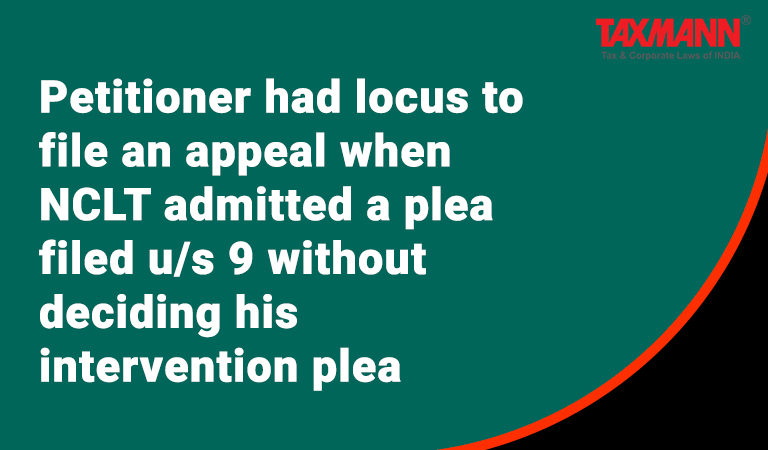Petitioner had locus to file an appeal when NCLT admitted a plea filed u/s 9 without deciding his intervention plea
- News|Blog|Insolvency and Bankruptcy Code|
- 3 Min Read
- By Taxmann
- |
- Last Updated on 12 December, 2022

Case Details: Anil Kaushal v. Colliers International (India) Property Services (P.) Ltd. - [2022] 145 taxmann.com 217 (NCLAT-New Delhi)
Judiciary and Counsel Details
-
- Justice Ashok Bhushan, Chairperson, M. Satyanarayana Murthy, Judicial Member
& Naresh Salecha, Technical Member - Sahil Sethi, Ms Ramya Aggarwal & Samriddh Bindal, Advs. for the Appellant.
- Manish Vashisht, Sr. Adv., Ms Shreya Gupta, Dhruv Rohatgi, Akhil Shankhwar & Yogesh Gupta, Adv. for the Respondent.
- Justice Ashok Bhushan, Chairperson, M. Satyanarayana Murthy, Judicial Member
Facts of the Case
In the instant case, the appellant was a homebuyer of a project being developed by the corporate debtor. The project which was launched in the year 2011, consisting of 3309 apartments out of these, 2600 apartments were sold to the financial creditors (homebuyers) who booked apartments, and the appellant was one of them.
The appellant entered into an agreement with the corporate debtor according to which the possession of the apartment was to be handed over on 11-11-2013. However, the corporate debtor defaulted in providing timely possession of the apartments to the financial creditor.
Consequently, the appellant, along with similarly placed allottees/financial creditors, filed a petition under section 7 against the corporate debtor, which was pending before the NCLT. Meanwhile, the R1 operational creditor who was engaged in the business of providing engineering and architect designing services raised various invoices for said consultancy services from time to time.
However, for non-payment of the amount covered by few invoices, the operational creditor sent an e-mail to the corporate debtor for payment and, due to non-receipt of payments, the operational creditor issued a demand notice and filed a section 9 application for initiating CIRP against the corporate debtor and the same was admitted by the NCLT.
Subsequently, the appellant, aggrieved by CIRP proceedings under section 9 filed an instant appeal on the ground that initially, the operational creditor vide e-mail dated 4-3-2020 demanded Rs. 88.90 lakhs, which was below the threshold limit of Rs. 1 crore, but to meet the shortfall of Rs. 1 crore, two more invoices were raised.
NCLAT Held
The Hon’ble NCLAT observed that a threshold limit of Rs. 1 crore specified in Notification No. 1205(E), dated 24-3-2020, will be applicable for an application filed under section 7 or 9 on or after 24-3-2020, even if a debt is of a date earlier than 24-3-2020.
It was held that where the appellant filed application under section 7 on basis of invoices issued on 4-3-2020, 1-4-2020 and 4-4-2020, an application was hit by section 10A, as no application for initiation of CIRP of the corporate debtor could be filed for any default arising on or after 25-3-2020 for a period of six months and, thus, said invoices dated 1-4-2020 and 4-4-2020 could not be considered for threshold limit of Rs. 1 crore as per section 4. Therefore the appeal was allowed, and the impugned order was to be set aside.
List of Cases Reviewed
-
- Order of NCLT (New Delhi) in IB no. 883/ND/2020, dated- 22-3-2022 (para 14) reversed.
- Rajkumar Bros and Production (P.) Ltd. v. Harish Amilineni Shareholders and Erstwhile Director of Amilionn Technologies (P.) Ltd. [2021] 125 taxmann.com 203/164 SCL 539 (SC) (para 11) followed.
List of Cases Referred to
-
- Kodeboyina Srinivas Krishna v. PVM Innvensys (P.) Ltd. [2021] 123 taxmann.com 66/163 SCL 617 (NCL – AT) (para 7)
- Ramesh Kymal v. Siemens Gamesa Renewable Power (P.) Ltd. [2021] 124 taxmann.com 226/164 SCL 455 (SC) (para 7)
- Rajkumar Bros & Production (P.) Ltd. v. Harish Amilineni Shareholders and Erstwhile Director of Amilionn Technologies (P.) Ltd. [2021] 125 taxmann.com 203/164 SCL 539 (SC) (para 13)
- Harish Amilineni v. Rajkumar Bros & Production (P.) Ltd. [2020] 121 taxmann.com 145/162 SCL 836 (NCLT – AT) (para 13).
Disclaimer: The content/information published on the website is only for general information of the user and shall not be construed as legal advice. While the Taxmann has exercised reasonable efforts to ensure the veracity of information/content published, Taxmann shall be under no liability in any manner whatsoever for incorrect information, if any.

Taxmann Publications has a dedicated in-house Research & Editorial Team. This team consists of a team of Chartered Accountants, Company Secretaries, and Lawyers. This team works under the guidance and supervision of editor-in-chief Mr Rakesh Bhargava.
The Research and Editorial Team is responsible for developing reliable and accurate content for the readers. The team follows the six-sigma approach to achieve the benchmark of zero error in its publications and research platforms. The team ensures that the following publication guidelines are thoroughly followed while developing the content:
- The statutory material is obtained only from the authorized and reliable sources
- All the latest developments in the judicial and legislative fields are covered
- Prepare the analytical write-ups on current, controversial, and important issues to help the readers to understand the concept and its implications
- Every content published by Taxmann is complete, accurate and lucid
- All evidence-based statements are supported with proper reference to Section, Circular No., Notification No. or citations
- The golden rules of grammar, style and consistency are thoroughly followed
- Font and size that’s easy to read and remain consistent across all imprint and digital publications are applied



 CA | CS | CMA
CA | CS | CMA
